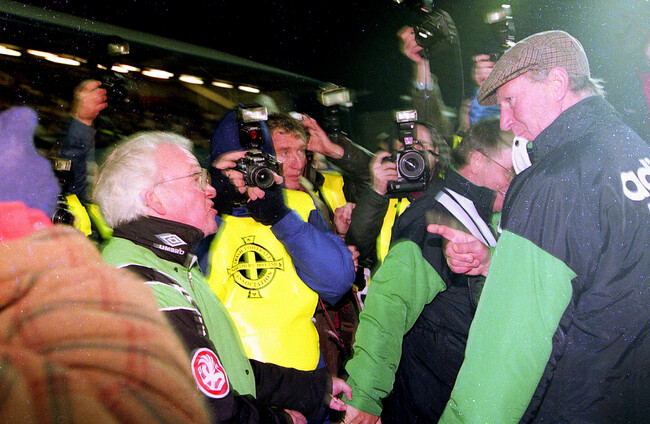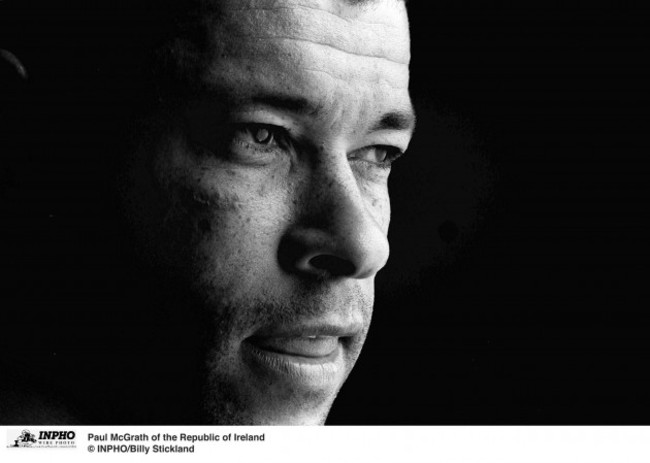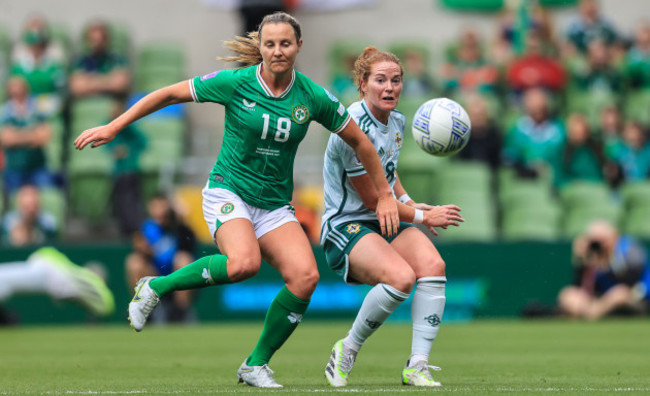AS THE WEEKS ticked down towards a football match, the atrocities kept coming.
In the six counties of Northern Ireland, there had been a lull in violence that summer of 1993. It was unusually hot and after a spring punctuated by the bombing of the British mainland in Warrington and Bishopsgate, settled into a peaceful period as the tar on the roads bubbled.
Winter was ushered in with a series of attacks on army helicopters coming into the barracks in Crossmaglen in late September, leading to the largest gunbattle between the British army and the Provisional IRA.
A month later, a catastrophic bomb planted in Frizell’s fishmongers on Belfast’s Shankill Road, intended to for a meeting upstairs of Loyalist paramilitary leaders, exploded prematurely.
It killed seven civilians, one UDA member and Thomas Begley, who along with Sean Kelly brought the bomb.
One week later, Ulster Freedom Fighters member, Torrens Knight, entered the Rising Sun bar in Greysteel, Derry and shouted ‘Trick or treat’ before raking the room with machine gun fire. Eight people; six Catholic and two Protestants were killed.
Just over two weeks later, the Republic of Ireland needed a draw, or ideally a win against Northern Ireland to qualify for the 1994 World Cup in America. In the crudest terms, the two traditions were at war, and had another war; minus the shooting.
The FAI, representing the interests of the Republic, were apprehensive and lobbied to have the game moved to Old Trafford. That increased tensions.
Northern Ireland manager Billy Bingham was a reserved soul who had previously led his team to two World Cup finals and two Home Nations Championships. He had announced this would be his last game. And while he was seen as measured and debonair, he threw his own verbal grenade into the build-up when he labelled some of the Republic players, qualified through the ‘Granny Rule’, as ‘mercenaries.
“They couldn’t find a way of making it with England or Scotland,” he said of players like Andy Townsend, Ray Houghton and John Aldridge. “I take a totally cynical view of the whole business. I am not prepared to skirt the issue, the same as I am happy to state it is our intention to stuff the Republic.”
The News Letter, usually pitching itself as the paper of farmers and straight down the line conservatism, had a back-page editorial that thundered, “We will tell you why they don’t want to come here. It is because they are yellow!”
But, come they did. By plane, because of security concerns and flanked by security guards togged out in the team tracksuits.
Inside the ground, FIFA had accepted IFA assurances that Windsor Park could host the game. There was a crowd limit of 10,000 with no away fans. Some Republic fans gained a few tickets but might have regretted their resourcefulness.
2,000 police, soldiers, stewards and barking angry dogs provided the backdrop. Once the game began, the abuse rained down. The most base-level sectarian slurs. Paul McGrath and Terry Phelan also received racist taunts.
And then there was Alan Kernaghan.
He was raised a Protestant in nearby Bangor with English parents and played for Northern Ireland schoolboys.
However, the IFA were against the eligibility rules and he found his path blocked to senior International football. The Republic weren’t so fussy, so he played for them and was screamed at for being the embodiment of a traitor, when he was anything but.
Working for The Belfast Telegraph and reporting for work at their Royal Avenue offices every day, chief soccer writer Jim Gracey was, both at once entirely repulsed and unsurprised.
“I worked my life in the Telegraph and every morning there was a bomb going off. We had bombs going off outside the building, we had bombs went off in the building, and we had van drivers murdered, for God’s sake,” he recalls.
“It’s a dreadful saying, but it was a way of life. Hard to explain what it was like.
“And, at the same time, you don’t want to explain to people. You want people to get on with their lives, a bit like how people of my generation felt when some oul’ fella would start telling you about what they seen in the Second World War, you know?”
Gracey was working the day of the Linfield-Dundalk European tie that became known as ‘The Battle of Oriel Park’ in 1979. He bore witness to a few Linfield-Cliftonville skirmishes. But this was another thing altogether.
“It was expected. We were in the centre of Belfast and day after day after day, it was just complete brutality. It went from what happened in the Shankill, to Greysteel. It was relentless.
“And everybody knew that the game was a tinderbox. I can say without fear or favour that it was the worst atmosphere I was ever felt in my life, anywhere.
“I had someone sitting beside me at the match and they turned to me at one point and said, ‘If these people had guns, they would shoot the players.’
“The atmosphere, ah… Febrile. Just horrendous.
“Ordinary people who wouldn’t have felt that way at all, they were foaming at the mouth. It was just the whole thing of the build-up and feelings.”
The football was terrible until Jimmy Quinn put Northern Ireland ahead on 73 minutes with a well-struck volley. If it stayed like that, then the Republic were going nowhere the following summer.
The locals flicked to the more staunch end of the songbook. ‘The Sash,’, with its’ lines about being ‘up to our necks in Fenian blood’ was on a loop.
At one stage, Bingham emerged from the dugout and twirled a finger in the air. The supporters cheered wildly. All decorum had left the building.
His assistant Jimmy Nicholl uncharacteristically approached Charlton’s own assistant Maurice Setters and said, ‘Up yours!’
And as we know, the Republic clawed the equaliser back, just three minutes after falling behind, through Alan McLoughlin. The final whistle was one of relief and euphoria.
Charlton made straight for Bingham and told him, ‘Up yours too!’
***
An hour after the game, a knock came on the Republic of Ireland dressing room door. An official of the IFA asked if Charlton might make a presentation to Bingham on the conclusion of his long and distinguished service.
He did so, feeling the hot flushes of embarrassment for how he had acted in the moment of the final whistle.
The fans drifted away from the ground, still with no ultimate outlet for this impotent rage.
Jim Gracey was sent along to America to cover the Republic of Ireland team for the Belfast Telegraph, his reports helping the paper to record sales in the summer of 1994.
By the end of August, the PIRA called a ceasefire. They were followed in the middle of October by the Combined Loyalist Military Command.
There’s no other way if saying it, but almost everything about Windsor Park in 1993 was ugly. The stadium was rotten and crumbling. The streaks of urine flowing from every wall said it all.
Once, in a piece for the Guardian, the recently passed journalist Henry McDonald talked about the naked hate that seemed to power the stadium. His final line was a hammer down on an anvil: ‘I’d level it.’
A redevelopment job that began just under ten years ago finally modernised it, bringing it to a capacity of 18,614.
Hamilton Architects were responsible for the design. A Catholic contractor – O’Hare and McGovern – carried out the work.
New stands were built for the south and east ends, while the west and north were significantly revamped. It cost €44 million. Soon after the redevelopment, Gracey was along with his close friend Norman Whiteside at a Windsor Park game and Whiteside had brought Paul McGrath.
McGrath looked out through the panoramic views onto the pitch and the neat, tidy stadium and recalled that night in 1993 when the monkey noises and shouts of well, you can imagine, stung his ears.
Gradually, almost aligned to the peace process, the culture shifted. Supporters groups deserve praise for changing the songbook. Instead of ‘No Surrender To The IRA’ and ‘The Sash’, NI fans now belt out cheery-beery versions of ‘Sweet Caroline’, and ‘We’re Not Brazil, We’re Northern Ireland.’
The culture is semi-manufactured, touchstones being a bit ‘Give My Head Peace’ and ‘Harp Lager is pure here’ and ‘Ulster fries’ and all that. A lot of references to Tayto crisps and generally naff enough comedy.
It’s fair to say the humour doesn’t exactly travel. But the main thing is, despite the puffed up and hollow objections to the redevelopment of Casement Park, the Northern Ireland soccer fanbase are happier.
There’s no anger anymore. Not really.
Here’s a thought that is bound to make a few people wince if they consider it. It’s just over a year now since the Irish women’s national team beat Scotland 1-0 and qualified for the World Cup.
In the dressing rooms after, they launched into the “Celtic Symphony’, with its’ chorus of ‘Ooh-Ah, up the ‘Ra.’
It led to the usual outrage from various sources. Some of it was even genuine. And yet, it won’t be mentioned come Tuesday night.
The culture is different around women’s sport. Gangs of lads aren’t calling into the pubs for hours before a game to get tanked up. Instead, the crowd will be heavy with girls who play the game or else parents bringing along for the vast majority, their daughters and sons.
In September, they played in the Aviva. There was no big deal. ‘God Save The King’ was played and everyone survived.
Now, Windsor Park is a family occasion. The home crowd will be there to cheer on the Marissa Callaghans, Lauren Wades and Simone Magills.
But equally, they will ooh and aah for every silky touch that Katie McCabe makes and the vision of Denise O’Sullivan.
30 years on, things could not be any more different. What’s changed?
The killing has stopped.
Sectarianism only ever fed off itself. And those days are gone now.
Forever.




